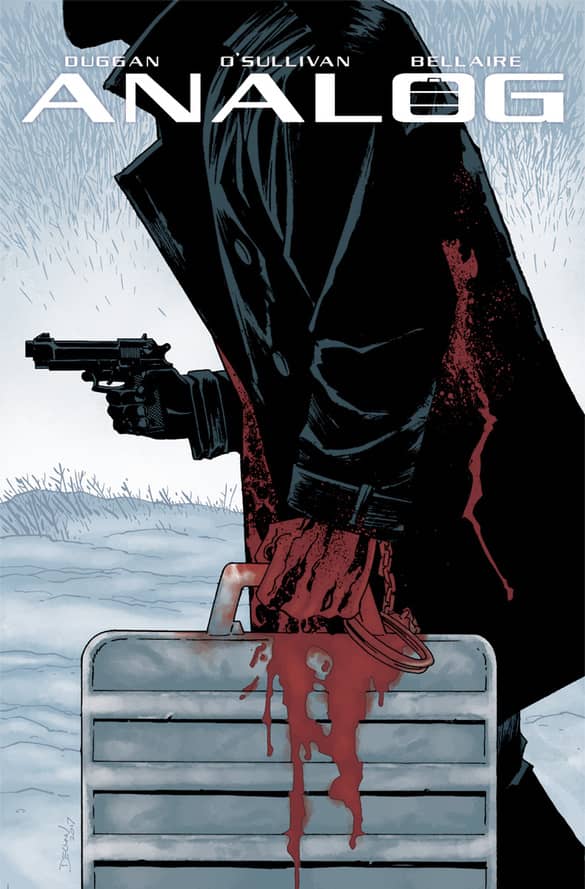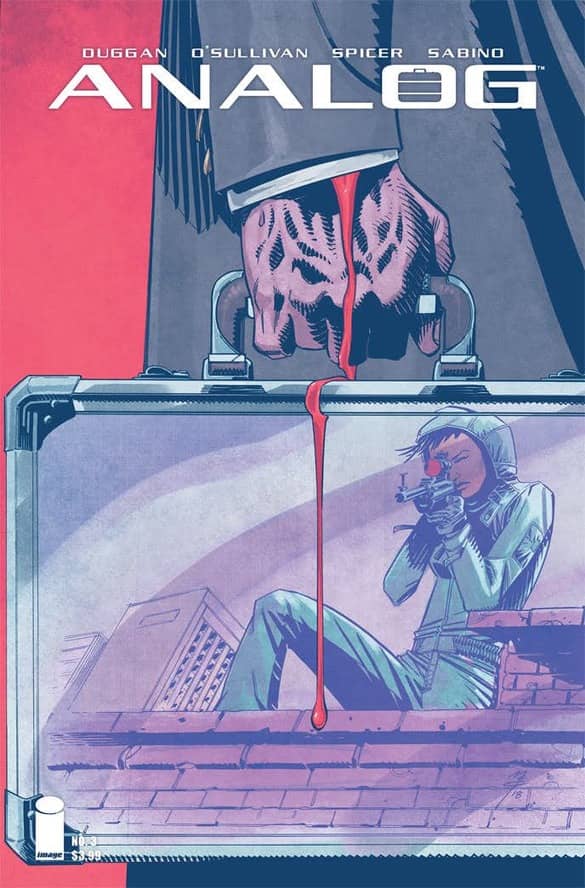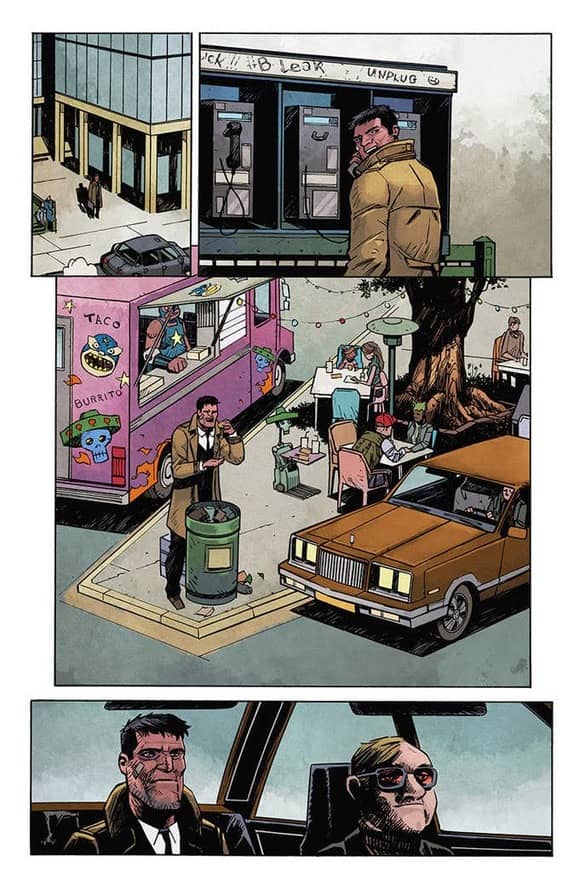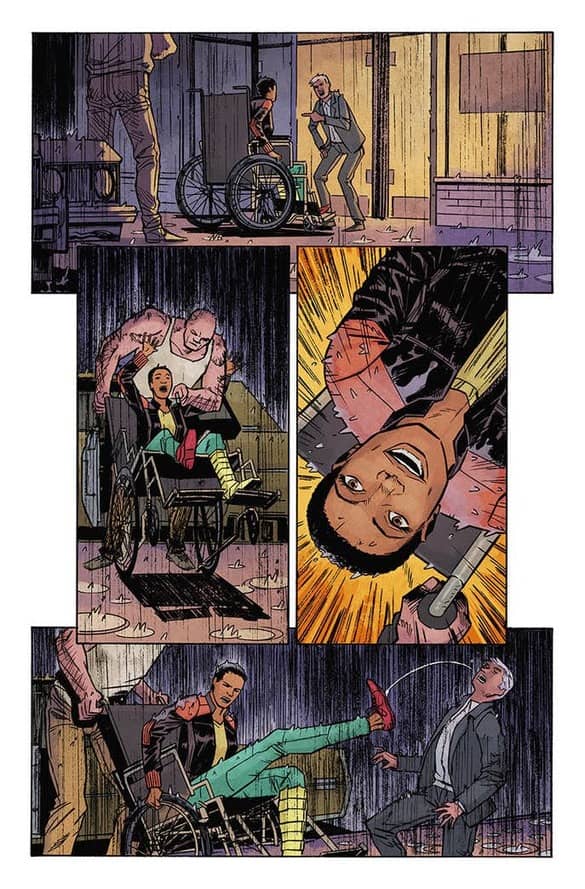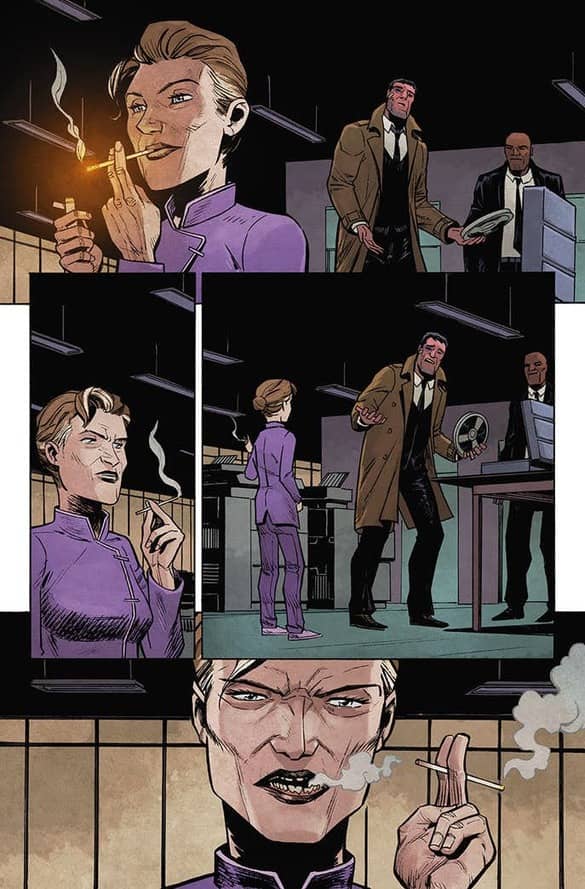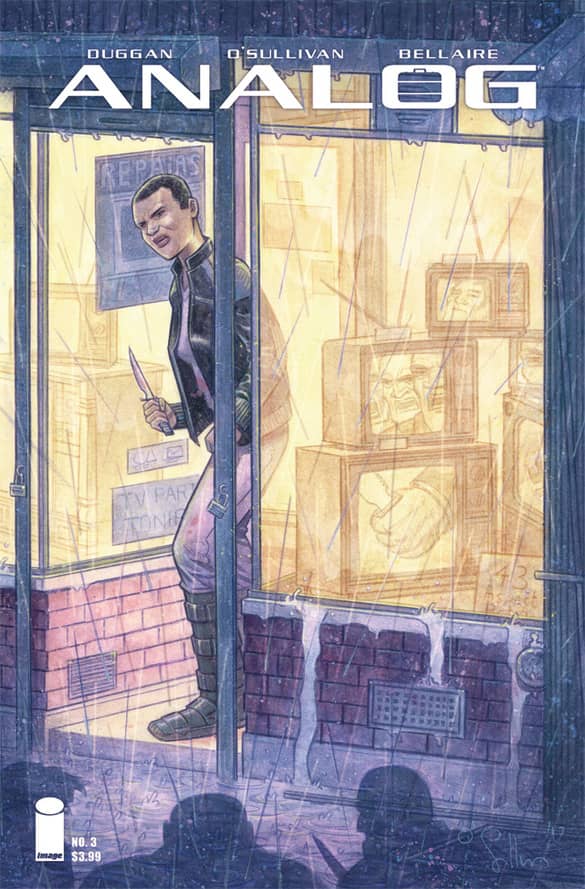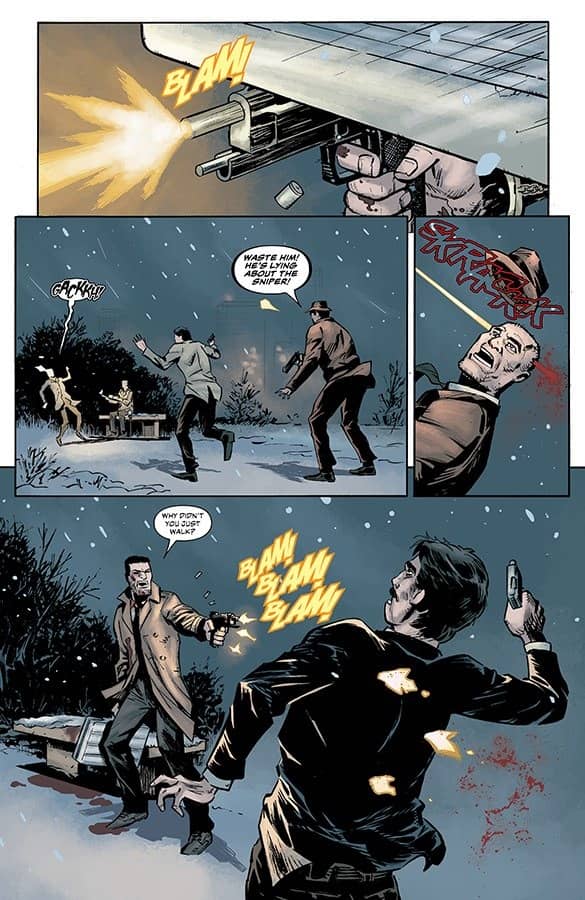Deadpool Writer Gerry Duggan Creates New Image Series: Analog
Many people know Gerry Duggan from his long run as the writer of Deadpool, or possibly as a TV writer on Attack of the Show. He’s recently paired with artist David O’Sullivan, colorist Mike Spicer and letterer Joe Sabino on Analog, a future noir action comedy Image comic set in a world where internet communications are not secure. The first trade is coming out soon, and a feature film adaptation is in the works at Lionsgate with the director of the John Wick trilogy, Chad Stahelski.
In the world they’ve created, computers and internet are no longer secure, so valuable corporate information must be carried by private couriers, who go armed and anonymous.
Jack McGuinness is one such courier, who has to fight his way through a lot of resistance to deliver his packages. His larger problem is that NSA’s surveillance function is also adapting to the analog world and he’s part of their answer. I managed to catch up with Gerry and David for an e-interview.
[Click the images for bigger versions.]
Derek: Thanks so much for your time, and welcome to Black Gate! You both created a fascinating world and a kind of unique post-apocalypse where society is not destroyed, but technology has been pushed way back. How long has this story been on your mind, Gerry?
Gerry: The first notes on my desktop go back to 2014. David began collaborating with me in 2015, and after the November of 2016 I began to be concerned that reality might overrun us, so we put the pedal down so we could begin publishing.
Gerry, I listened to a podcast interview you gave about Analog. One of the things that stuck with me was about the way the internet records everything and that people now live with every mistake they made in their youth. How much of a danger do you think that is to modern readers?
GD: We’re not emotionally or intellectually equipped to exist in a world where our past is etched in stone for anyone to view. I remember life before the internet. I quit Facebook and I’ve been happier and more productive.
I’ve also found that I have more texts, emails and phone calls from friends and family. Like the old days of the early oughts. Even if theses platforms are benign the people that will farm it for your information aren’t.
There will need to be a digital bill or rights. Europe is really leading the way in this area. On another note with regard to your question: I think anyone in the comic book business better believe in redemption. People change.
Gerry, you mentioned in a CBR interview that you hope that your analog world never needs to happen, but I’m wondering if the effect you got literarily with the Great Doxxing might not also come from the advent of quantum computers, which are arguably close (2-3 decades) and which could crack any encryption?
GD: I think if the clouds open up, it will be simpler and more mundane explanation than the dawn of quantum computing. It’s cheap to wage war over the internet. Look at what the enemies of democracy have already accomplished, and not a shot was fire. Jack McGinnis started a backdraft against it. However, quantum computing and AI are the next big races. The starting gun has already been fired, and that’s a whole other level of disruption.
David, Gerry’s scripts were demanding in that you had to visualize a world like ours, but slightly twisted. There’s a backwards feel to a world thinned of cell phones and computers, but still futuristic from when we are now. Can you talk about the subtle artistic choices you had to make to give the world of Analog verisimilitude?
DO: It really depends on the story and the character. Not everybody in Analog has rejected phones and computers. Some characters have embraced the freedom of no secrets after the Great Doxxing while others dread their secrets getting out in the open. So it depends on the character and their location on whether or not you see a phone, computer or a robot.
Analog is set in the not so distant future, so what exist in our laboratories today is what we would see on the streets of Analog, with a slight exaggeration on how advanced the AI is.
In one of Gerry’s descriptions of the Analog world, he mentioned robots taking work from the everyday person. So I took that and played it against my own experience with technology.
That it’s not fit for its purpose. It doesn’t connect to Wi-Fi, stalls, crashes at the worst time possible. Basically lets you down when you need it.
So I put broken down robots in a few panels, here and there. Either from wear and tear or smashed up by people who lost their jobs to a robot.
I think the broken real world robots play well against the incredibly smart AI that exists elsewhere in Analog. So, the incredible technology to better mankind exists but we get the cheap knock off.
David, you were scooped up by Gerry for your first major comic book work. It’s now become a monthly comic book and is being adapted into a movie. A monthly book can be punishing. How has your life changed by joining team Analog?
DO: I have a lot less free time! When I first started Analog we took our time with the script and art. Since I had the extra time I painted the covers traditionally.
When we got to the 5 th issue we were getting close to its deadline. We had the first 10 pages finished and the remaining 17 pages needed to be done in a smaller time frame. So after panicking because I had never drawn an issue that fast, I got to work and made sure I hit that deadline.
After that I realized I can work faster and there’s not much difference in the end result. While with the next arc the deadlines aren’t as tight, I still try to get as much done as quickly I can so we can get the second arc out to readers as soon as possible. The painted covers are out the window!
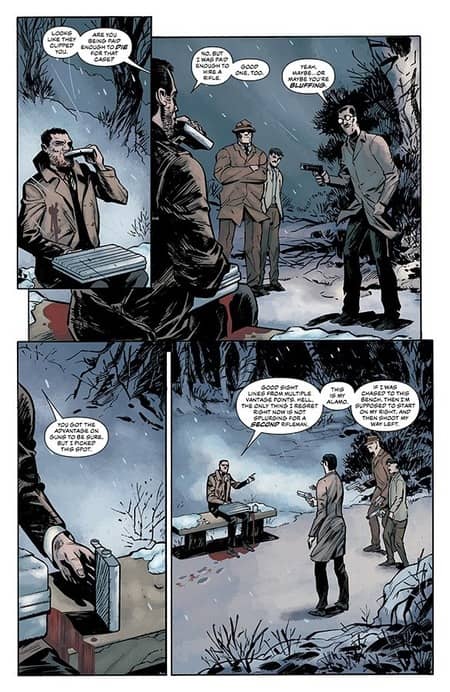 |
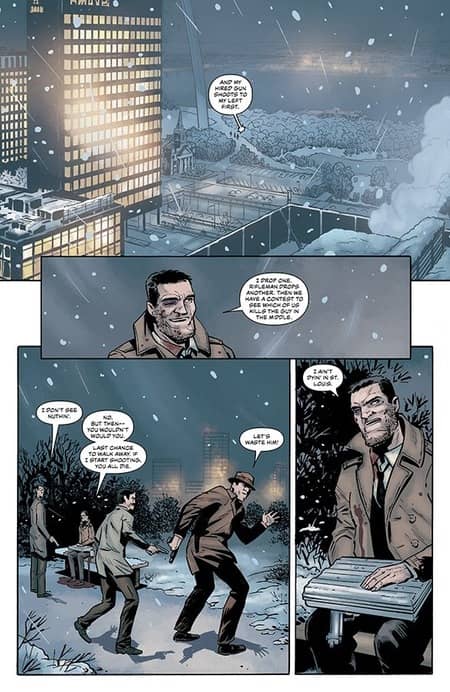 |
David, you mentioned in a comicverse interview that Jordie, your colorist, really knows how to lead a reader through a page and get them to look at what’s important. I’d thought of that partly as an penciller’s role, and a letterer’s, so I was fascinated by that comment. Could you expand on how you think Jordie did that with color in Analog? And how much influence did you have on colors?
DO: I guess it’s everybody’s job. It’s hard to sum up in a few sentences and it’s something that you could study for a long time. But Jordie and our new colorist Mike Spicer do it so well. They can get a reader to look at a small section of a detailed page.
You can have the focal point the most or least saturated color in contrast to the rest of the page, or have the focal point as a light tone against a dark tone or vice versa. Colorists deal emotion, atmosphere, how light works, how to render different materials, assigning a color to represent a character.
There’s so much that they do that goes unnoticed. I have zero influence over the colors, that’s the colorist’s job and they can do it better than me!
Gerry, in one of your interviews, you joked that, if anything your origin story is having been bitten by a radioactive sad clown, hence the violent, funny, biting tone of Deadpool. A similar mix of sad and funny are in Analog, although perhaps more of the sad. Why these two emotions for you as a writer and for this series in particular?
GD: The joke-brain never turns off. Thinking of jokes is an involuntary response to the world around me. Whether or not I share them, or how widely you share them is then a conscious decision.
I think every issue of Analog has always started so seriously, and then ended up with a few funny things peppered in. Granted, some of the stuff that David draws is so funny. Popps making meatballs in his underwear and apron. Or some of the fucked up ways he renders the world. But almost anything that would make you laugh doesn’t show up until we’re thinking about the script and polishing it after David’s inks are wrapped.
Deadpool’s sad and funny beats were shoved close together, designed to make you feel like you’ve got whiplash. Analog’s a different muscle group. Nothing better making you laugh and then punching you in the gut. Comics are entertainment, and I think people are paying to be surprised.
Thanks so much for the interview Gerry and David! I loved Analog, and am slightly disturbed by some of the clear and present dangers in our world that make it almost real. If readers are looking to check out Analog, the first trade paperback will be in your local comic book shops soon!
Derek Künsken is an Asimov award-winning writer of science fiction and fantasy living in Gatineau, Québec. He tweets from @derekkunsken and his first novel, The Quantum Magician, will be released in October from Solaris Books.
